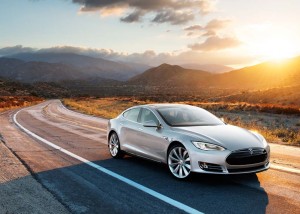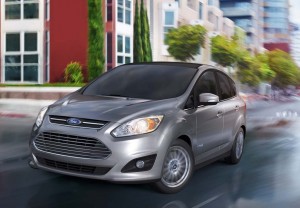While Japanese makers continue to dominate the influential Consumer Reports annual vehicle reliability survey, General Motors, Audi and Volvo made significant gains, each cracking into the Top 10 this year.
While Detroit makers, on the whole, have been gaining ground, Ford Motor Co. dipped well below average. The second-largest of the domestic auto manufacturers has been hammered by complaints about its digital infotainment systems – an issue that has been causing grief for many of its competitors, as well, according to the CR survey of 1.1 million vehicle owners.
The annual survey contained a number of surprises, including some unexpected problems plaguing traditionally Japanese manufacturers. Meanwhile, Consumer Reports announced that some of the most popular Asian products, including Toyota’s Camry, RAV4 and Prius V models, have lost their coveted “Recommended Buy” rating because of their poor performance in new crash tests.

The Tesla Model S scored above average -- notably with no complaints about battery powertrain problems.
Unlike some quality-based surveys that don’t differentiate between defects and dislikes – a broken engine, say, compared to a poorly designed cupholder – the annual Consumer Reports study is “about what really broke,” said Jake Fisher, the magazine’s director of automotive testing, during a news conference sponsored by the Automotive Press Association.
The study put Lexus at the top followed by its more mainstream sibling brand, Toyota. Acura landed in the third spot, ahead of Audi – the German manufacturer only breaking into the Top 10 a year ago. Mazda rounded out the five leading brands.
While the Japanese topped the chart, Fisher also noted, “We’re seeing some problems from the Japanese.” Subaru, for example, “stumbled from a fifth-place ranking last year to 10th. Scion and Nissan also fell sharply in the reliability study, the latter maker dipping to 22nd among the 28 brands formally covered by Consumer Reports this year.
“These are not brands we’re used to seeing below average,” Fisher said.
(Consumer Reports slams new Lexus, Infiniti models. Click Herefor details.)
The Japanese were also hurt by ongoing problems with problems with their infotainment systems – though not nearly as bad as Ford. A full 17% of owners reported having problems with the technology on the Detroit maker’s C-Max model, the plug-in version of that people-mover coming in dead last among all models in the Consumer Reports survey.
Ford also had powertrain problems, Fisher noted, including transmission and turbo issues. That was a sharp setback, he noted, for a brand that – just a few years ago, was making significant strides in quality and reliability, Ford starting to top some of the best of the Japanese brands.
(Despite government shutdown, October car sales looking strong. Click Herefor more.)
General Motors was, on the whole, just slightly above average, but its GMC brand also broke into the Top 10, with Buick not far behind. GM would have done even better, Fisher suggested, were it not for problems with the big XTS, that new luxury sedan driving the Cadillac brand down into 25th among the 28 brands.
The newest domestic automaker would have also broken into the Top 10 if there were enough owners to cross the minimum threshold, the auto testing director noted. California-based start-up Tesla Motors had not a single problem with the battery-electric drivetrain on its new Model S. And, notably, there were no complaints about the huge touchscreen-based infotainment system in the sedan, either.
The latest CR survey underscored the fact that even the best brands can have problem products – the Honda Accord V-6 being a particularly poor performer this year. On the other hand, even brands in the middle of the pack or lower can have a few stellar models. That was the case with middle-ranked Dodge, its 2.0-liter Dart model “the most reliable model we’ve seen from the domestics,” Fisher emphasized.
(Quality on the rise, GM struggles to change perceptions. Click Here for more.)
Consumer Reports has a significant impact on both auto makers and auto buyers, and any model that lands the magazine’s coveted “Recommended” rating has a clear leg up on the competition. That endorsement is based on three pillars: the annual reliability survey, road tests conducted by the magazine, and vehicle crash tests.
CR decided to get tougher, and a number of models that were barely up to snuff in the road test category have lost their “Recommended” rating this year, including the Mazda2, the Hyundai Tucson, the Lexus CT 200h and the Chevrolet Equinox.
But the magazine also dropped four models that failed the newest crash test introduced by the Insurance Institute for Highway Safety. The so-called Small Overlap test is designed to simulate a very common form of crash, such as when two cars clip one another on a two-lane highway, or when the front corner of a vehicle strikes a pole.
Earning a “Poor” rating from the IIHS meant CR pulled its endorsement of three Toyota models: the Camry – America’s best-selling passenger car – as well as the RAV4 crossover and the Prius V hybrid. The popular Audi A4 also lost its “Recommended” rating.
The list of brands follows. Brands are listed by rank this year and the number of spots they are up or down from the 2013 survey.
1. Lexus +2
2. Toyota (same)
3. Acura +4
4. Audi +4
5. Mazda -1
6. Infiniti +3
7. Volvo +13
8. Honda -2
9. GMC +3
10. Subaru -5
11. Scion -10
12. Buick +9
13.Mercedes-Benz +1
14. Porsche N/A
15. BMW +1
16. Kia -6
17. Chevrolet -2
18. Chrysler +5
19. Ram +6
20. Volkswagen -2
21. Hyundai -4
22. Nissan -9
23. Jeep -4
24. Dodge (same)
25. Cadillac -14
26. Ford +1
27. Lincoln -1
28. Mini -6
Source: Consumer Reports


Though I don’t particularly care for Asian auto models I’m not sure linking new crash tests to models produced before the new test was implimented, is a legitimate decision.